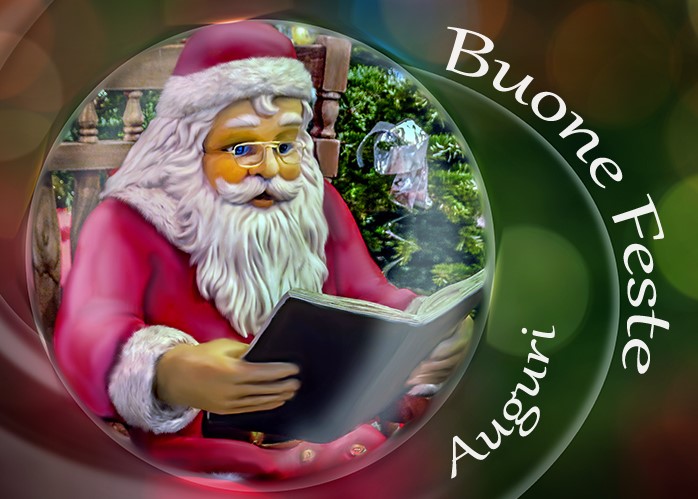
Hello everybody, it’s the holiday season! Since I like to be jolly during this time of the year, I thought I would teach you some words you can use during this magical time. Let’s dive right in!
Let’s start very generic with a simple Buone feste – Happy holidays. This can be used for all the celebrations that happen in December and January going from the Immacolata – the Immaculate Conception – on December 8th, to Natale − Christmas, −Capodanno − New Year’s, and Epifania or Befana − Epiphany − and everything that might be celebrated in between (for example I live near Milan and we celebrate Sant’Ambrogio − Saint Ambroeus, on December 7th, as well).
If you want to be specific, it’s pretty simple you add buon or buona before the name of the celebration. For example, you can say buon Natale or buona Capodanno, but watch out, you’ll have to say buona Befana or buona Epifania, because those are feminine. As an alternative you can say felice – merry – and this is neutral so it can be used for both masculine and feminine nouns. Or you can choose the even easier choice: auguri!
But let’s get down to business, to what is truly important for Italians…il cenone. Well, I should specify; you can have a cenone either on Christmas Eve – vigilia di Natale (vigilia for short), which is more common in the center and south of Italy rather than in the north where people have a pranzo di Natale, or on New Year’s Eve – l’ultimo dell’anno (l’ultimo for short), and I guess it can be translated with “feast,” but it is much, much more. You basically start eating without ever knowing when you’ll stop. It comprises of many different courses and many bottles of wine, sometimes it has breaks in which people play games, watch the national concert or traditional movies, but one thing is for sure. It will last for hours. You see, when using the word cenone, your mind should immediately go the either the vigilia or l’ultimo. In fact, it’s not a cenone for Easter or other celebrations.
Some useful words in this period of time are regalo (pl. regali) – gift – which can be made – fare un regalo, given – dare un regalo, or received – ricevere un regalo. In Italy, gifts are brought by Babbo Natale – Santa Claus – who comes on a slitta – sleigh – with his renne – reindeer − and brings the regali coming down from the camino − chimney. Although, I have to admit that when I was a kid Gesù Bambino – Baby Jesus – would bring them to me. Most houses make a albero di Natale – Christmas tree – and a Presepe − nativity scene – and decorate the house luci – light, stelle di Natale – poinsettias, and ghirlande − wreath. Later on, the Befana will bring calze – stockings – full of caramelle – candies – or carbone – (edible) charcoal – depending on whether you were good or naughty. Often times, townships and cities organize mercatini di Natale – Christmas markets – where you can find handmade products, traditional salumi – cure meat, formaggi – cheese, and traditional Christmas food.
There are also some recurring phrases used all across Italy which became kind of a habitual spiel: Se non ci vediamo più, auguri! – if we don’t see each other again (before the holidays end), happy holidays! Or cosa fai a Capodanno? What are you doing on New Year’s? There are also famous sayings about the holidays: L’Epifania tutte le feste porta via – Epiphany takes all the holidays away – since January 6th is our last national holiday before going back to both work and school. Anno nuovo, vita nuova – New year, new life. Chi lavora a Capodanno, lavora tutto l’anno – Those who work on New Year’s, work all year. I must say, lavorare is often switched with any other activity you would like to do all year long. And even, Natale con i tuoi, Pasqua con chi vuoi – Christmas with your relatives, Easter with whoever you want.
Well, I have one thing left to say: Buone feste!



